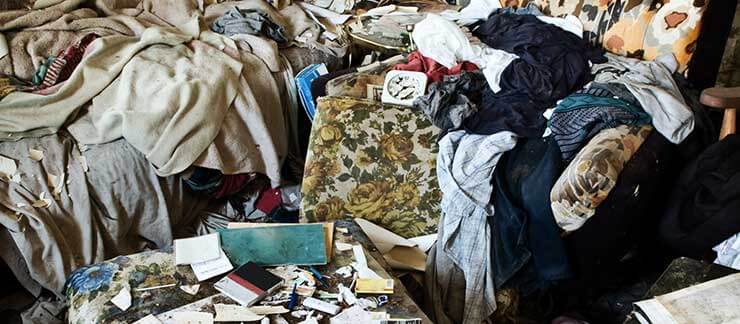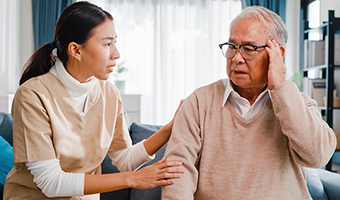Clutter: An Initial Sign Your Senior Needs a Professional Caregiver
Clutter can be one of the first signs that your loved one needs help. When you visit your mom, who normally has the house in near-mint condition, and the house looks unkempt, you know something’s off. You may have to play detective and interpret the clues. Seniors don’t always ask for the help they need, so you can’t wait for her to make the first move. If you think she’s struggling, it might be time to consider whether she needs some more help.
The Impact of Clutter
Clutter poses a significant risk to aging seniors living alone at home. The statistics are no surprise by now. Falls are the leading cause of fatal and non-fatal injuries in American seniors. The Center for Disease Control (CDC) says that more than one in four seniors will fall each year, with 2.8 million emergency room visits occurring as a result. Two years ago, the total financial impact of senior falls was over $50 billion. Medicare and Medicaid paid 75 percent of these costs.
Falls lead to severe injuries, like hip fractures, broken bones and brain injuries. They can also cause depression and isolation. The National Institute on Aging (NIA) says that the fear of falling often prevents seniors from leaving the house to socialize. If your senior falls once, the risk of future falls double, and the possible health complications increase with each fall.
Seniors often have underlying health issues that can make them more prone to falling and make potential injuries more serious. When you consider poor eyesight, a misplaced item on the floor in a walkway can become a big issue.
Clutter is problematic and could be a sign of underlying health problems.
Physical Factors
Clutter can be a sign that your mom isn't able to keep on top of day-to-day housework anymore. If dishes are piling up in the sink, it may be a matter of ability instead of motivation. Your parents may be reaching an age where their muscles and skeleton weaken; an occurrence called sarcopenia. Conditions like arthritis, a painful joint inflammation, are also more common in seniors and can affect dexterity. Often, seniors can be too proud to ask for help, or in denial that they need help. This may be because they don’t want to be a burden on family or friends, or because they fear that a change in routine might lead to a loss of privacy and independence.
Forgetfulness
It may be that clutter is a sign that your loved one’s faculties are diminishing. If your mom is missing steps in her usual daily routine, like forgetting to vacuum or clear up after dinner, it could be an early sign of dementia. Loss of initiative can manifest itself in ways like forgetting housework, not carrying out basic personal hygiene or forgetting to pay bills, can be tell-tale signs. We all forget things, misplace car keys or mix up names, but regular occurrences, particularly in an older person, could be a warning, especially if any of these other issues, like problems communicating, are also evident. If you suspect your loved one is exhibiting signs of dementia, contact her physician.
Depression
A decline in the cleanliness of your loved one’s home could also be due to depression or mental fatigue. Over six million American seniors live with depression. Seniors are at more risk of depression for many reasons. As they age, they don’t produce the same levels of chemicals like serotonin that help balance moods. Physical problems, like loss of mobility, can cause them to become isolated and loneliness can be a prime cause of depression. Boredom can be a factor and seniors also face many issues that can be upsetting, like the loss of friends and loved ones, and facing their own mortality.
As with dementia, if a general malaise and lack of effort around the home is accompanied by other signs of depression, like weight loss, sudden mood changes and trouble sleeping, it may be wise to contact a medical professional.
How to Help
Maybe friends and family could help your loved with housework if needed, but remember, this may be a long-term commitment. Of course, you can pick up after your loved one, but that may not address the underlying causes of the clutter in your loved one’s home.
A professional caregiver can help your mom with housework, either by carrying out tasks that she physically can’t manage or by offering gentle reminders of the tasks still to be done if she is determined to do them herself. If your loved one is determined to live at home as mental faculties wane, professional home care can see to it.
And if the clutter in your loved one’s home does become evidence of a deeper problem, a professional caregiver can help with those conditions, too. If your loved one is in the early stages of dementia, a caregiver can help her keep up with her daily routine and also offer stimulation to help to slow the advance of the disease, while watching for signs of the condition deteriorating. If your loved one is depressed, a professional caregiver can help her to be active and to socialize, either by offering companionship or by enabling interaction with her peers.
Whatever the reason for the clutter in your loved one's home, the time to act on it is now. It may be indicative of underlying problems that must be addressed.
Discover more risks posed by clutter by clicking here and learning how to fall-proof an elderly loved one's home.














